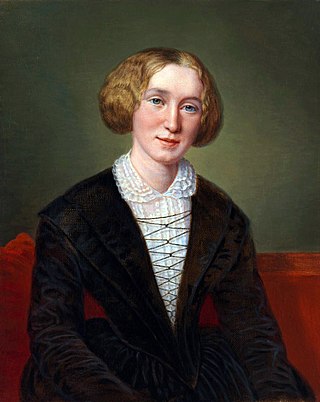
Mary Ann Evans, known by her pen name George Eliot, was an English novelist, poet, journalist, translator, and one of the leading writers of the Victorian era. She wrote seven novels: Adam Bede (1859), The Mill on the Floss (1860), Silas Marner (1861), Romola (1862–1863), Felix Holt, the Radical (1866), Middlemarch (1871–1872) and Daniel Deronda (1876). As with Charles Dickens and Thomas Hardy, she emerged from provincial England; most of her works are set there. Her works are known for their realism, psychological insight, sense of place and detailed depiction of the countryside. Middlemarch was described by the novelist Virginia Woolf as "one of the few English novels written for grown-up people" and by Martin Amis and Julian Barnes as the greatest novel in the English language.
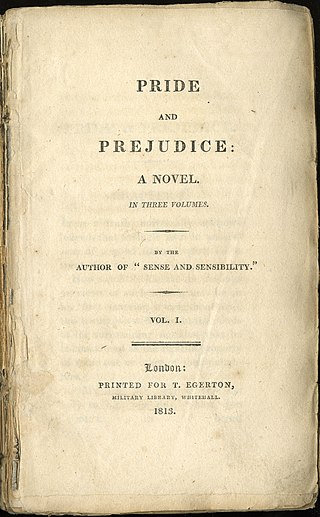
Pride and Prejudice is the second novel by English author Jane Austen, published in 1813. A novel of manners, it follows the character development of Elizabeth Bennet, the protagonist of the book, who learns about the repercussions of hasty judgments and comes to appreciate the difference between superficial goodness and actual goodness.

Jane Eyre is a novel by the English writer Charlotte Brontë. It was published under her pen name "Currer Bell" on 19 October 1847 by Smith, Elder & Co. of London. The first American edition was published the following year by Harper & Brothers of New York. Jane Eyre is a bildungsroman that follows the experiences of its eponymous heroine, including her growth to adulthood and her love for Mr Rochester, the brooding master of Thornfield Hall.

Middlemarch, A Study of Provincial Life is a novel by English author George Eliot, the pen name of Mary Ann Evans. It appeared in eight installments (volumes) in 1871 and 1872. Set in Middlemarch, a fictional English Midlands town, in 1829 to 1832, it follows distinct, intersecting stories with many characters. Issues include the status of women, the nature of marriage, idealism, self-interest, religion, hypocrisy, political reform, and education. Despite comic elements, Middlemarch uses realism to encompass historical events: the 1832 Reform Act, early railways, and the accession of King William IV. It looks at medicine of the time and reactionary views in a settled community facing unwelcome change. Eliot began writing the two pieces that formed the novel in 1869–1870 and completed it in 1871. Initial reviews were mixed, but it is now seen widely as her best work and one of the great English novels.

Daniel Deronda is a novel written by English author George Eliot, first published in eight parts (books) February to September 1876. It was the last novel she completed and the only one set in the Victorian society of her day. The work's mixture of social satire and moral searching, along with its sympathetic rendering of Jewish proto-Zionist ideas, has made it the controversial final statement of one of the most renowned Victorian novelists.
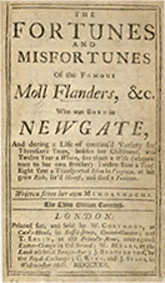
Moll Flanders is a novel by Daniel Defoe, first published in 1722. It purports to be the true account of the life of the eponymous Moll, detailing her exploits from birth until old age.

Agnes Grey, A Novel is the first novel by English author Anne Brontë, first published in December 1847, and republished in a second edition in 1850. The novel follows Agnes Grey, a governess, as she works within families of the English gentry. Scholarship and comments by Anne's sister Charlotte Brontë suggest the novel is largely based on Anne Brontë's own experiences as a governess for five years. Like her sister Charlotte's 1847 novel Jane Eyre, it addresses what the precarious position of governess entailed and how it affected a young woman.

Pride and Prejudice is a 1940 American film adaptation of Jane Austen's 1813 novel Pride and Prejudice, starring Greer Garson and Laurence Olivier. Directed by Robert Z. Leonard, the screenplay was written by Aldous Huxley and Jane Murfin, adapted specifically from the stage adaptation by Helen Jerome, in addition to Jane Austen's novel.
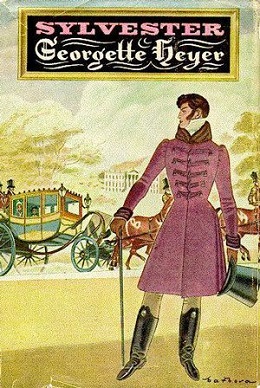
Sylvester, or the Wicked Uncle is a Regency romance novel by Georgette Heyer. First published by Heinemann, London and Putnam, New York in 1957, it is the story of intelligent and desperate Phoebe who ends up marrying the man she has run away from home to avoid, and whom she has caricatured as the villain in her novel. The book features gentle mockery of the Gothic novel genre and also features Heyer's characteristic strong heroine, with a desire for independence, who marries on her own terms. The story is set in 1817-1818.

The Corinthian is a regency novel by Georgette Heyer.
Cousin Kate is a 1968 Regency romance novel by Georgette Heyer. The story is set in 1817 and 1818. The novel was written at a point when Heyer, not long after she had recovered from an illness, was reportedly "desperate for a plot" and "still worried about finances".
This is a list of fictional stories in which illegitimacy features as an important plot element. Passing mentions are omitted from this article. Many of these stories explore the social pain and exclusion felt by illegitimate "natural children".

Gwendolen is a feminine given name, in general use only since the 19th century.
Leonce and Lena is a play by German dramatist Georg Büchner (1813–1837); while considered a comedy, it is a satire veiled in humor. Written in the spring of 1836 for a competition 'for the best one- or two-act comedy in prose or verse' sponsored by Stuttgart publisher Cotta. However, Büchner missed the submission deadline and the play was returned unread. It was first performed almost 60 years later, on May 31, 1895, in an outdoor performance by the Munich Company Intimes Theater, directed by Ernst von Wolzogen and with the involvement of Max Halbe and Oskar Panizza, illustrating the fact that Büchner only gained prominence as a writer in the 20th century.

The Earl and the Fairy is a completed series of light novels written by Mizue Tani and published in Japan by Shueisha. The story is serialized in Cobalt magazine and illustrated by Asako Takaboshi (Ayuko).

Daniel Deronda is a British television serial drama adapted by Andrew Davies from the 1876 George Eliot novel of the same name. It was directed by Tom Hooper, produced by Louis Marks, and was first broadcast in three parts on BBC One from 23 November to 7 December 2002. The serial starred Hugh Dancy as Daniel Deronda, Romola Garai as Gwendolen Harleth, Hugh Bonneville as Henleigh Grandcourt, and Jodhi May as Mirah Lapidoth. Co-production funding came from WGBH Boston.

The Bennet family is a fictional family created by the English novelist Jane Austen in her 1813 novel Pride and Prejudice. The family consists of Mr and Mrs Bennet and their five daughters: Jane, Mary, Catherine, Lydia, and Elizabeth, who is the novel's protagonist.
Sara Sophia Hennell was a British author. She was a close associate of George Eliot, Charles Christian Hennell and Caroline and Charles Bray.
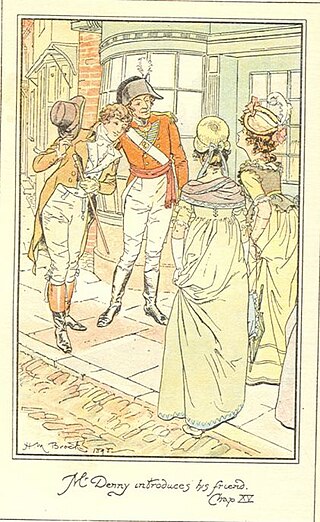
George Wickham is a fictional character created by Jane Austen who appears in her 1813 novel Pride and Prejudice. George Wickham is introduced as a militia officer who has a shared history with Mr. Darcy. Wickham's charming demeanour and his story of being badly treated by Darcy attracts the sympathy of the heroine, Elizabeth Bennet, to the point that she is warned by her aunt not to fall in love and marry him. It is revealed through the course of the story that George Wickham's true nature is that of a manipulative unprincipled layabout, a ne'er-do-well wastrel, compulsive liar and a degenerate, compulsive gambler, a seducer and a libertine, living the lifestyle of a rake. Lacking the finances to pay for his lifestyle, he gambles regularly and cons credit from tradesmen and shopkeepers and skips out on paying-up.
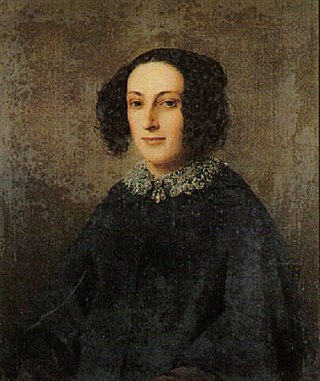
Josepha Heath Gulston was a Welsh novelist. She published five novels in the 1850s under the pseudonym Talbot Gwynne.
















